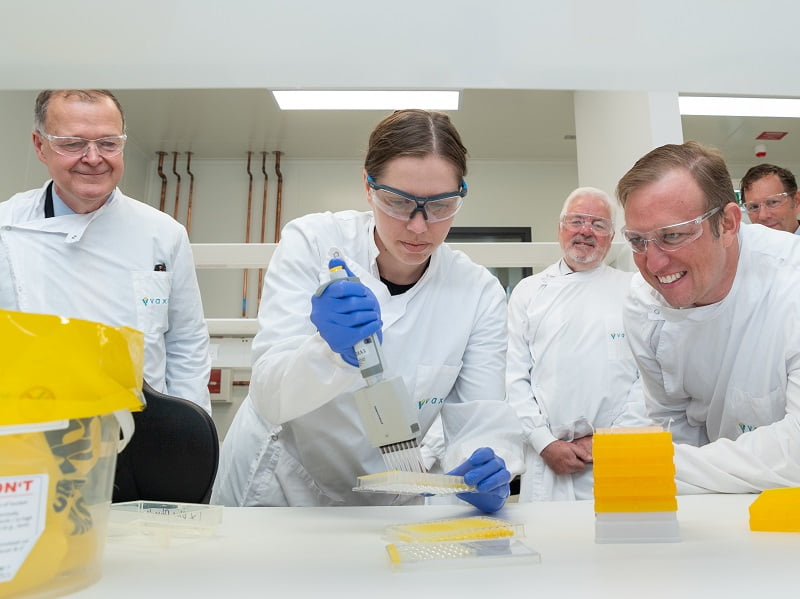A multi-million-dollar manufacturing facility capable of producing needle-free vaccine patches in Queensland within the next five years has been completed by Brisbane-based biotechnology company Vaxxas.
The Vaxxas Biomedical Facility, which will double as the firm’s new global headquarters, opened on Monday, almost three years after the state government stepped in to secure the hub on Australian soil.
At 5,500 square metres, the “first-of-its-kind manufacturing site” is expected to allow Vaxxas to scale up production of its proprietary needle-free vaccine technology, the high-density microarray patch (HD-MAP), for late-stage clinical trials and commercialisation.
The patented technology can be used to deposit a vaccine through the surface of the skin, removing the need for a needle. The patch encompasses thousands of micro projections that are coated with a vaccine using a dry-printing technique, according to the company.

Once fully operational, the facility is expected support up to 200 high-skilled jobs and be capable of producing millions of vaccine patches per year, however this is not expected before 2026 at the earliest.
Vaxxas chief executive David Hoey, who has been with the company since 2012, said the opening of the facility represents a significant milestone for a company that spun out of the University of Queensland in 2011.
Mr Hoey said the company’s vaccine patch technology was “advancing rapidly towards commercialisation”, with several human clinical trials involving more than 500 people successfully completed to date.
Early clinical studies for COVID-19 and seasonal influence are also continuing in Australia, while other vaccine studies targeting pandemic influenze have been funded by the United States government.
“The Vaxxas Biometrical Facility will firmly position Australia at the forefront of vaccine technology innovation, thanks to the support of the Queensland state and Australian federal governments,” Mr Hoey said.
“The site will significantly increase our manufacturing capacity, creating new local and skilled jobs, while enabling Vaxxas to progress through late-stage clinical trails that will bring our first commercial vaccine products to the market.”
The company secured $34 million through a capital raise in December – its first funding round for eight years. It had previously raised around $100 million in equity funding, and more than $100 million in non-dilutive financial support, according to the Australian Financial Review.
It has also received $8 million through the federal government’s Modern Manufacturing Initiative to “support specialised manufacturing infrastructure at the Vaxxas Biomedical Facility”, expected to be installed from 2024.
A further $1.6 million in co-investment was provided by the Advanced Manufacturing Growth Centre in 2021 to help Vaxxas improve its manufacturing processes and operations.
Queensland deputy premier Steven Miles, who was present at the opening on Monday, said the state-of-the-art facility is an example of how Queensland is “fast shaping up as a global research and innovation hub”.
“This world-renowned technology has the potential to play a vital role in pandemic preparedness because it allows vaccines to be deployed quickly and easily to our communities,” he said in a statement.
The Queensland government provided Vaxxas with funding for the manufacturing facility – which is housed in an Economic Development Queensland-owned building in the Northshore Hamilton Priority Development Area – in September 2020.
According to the state government’s 10-year Queensland Biomedical roadmap and action plan, the company had been “likely to relocate to the USA” without support.
Vaxxas was previously based at the Translational Research Institute, which the state government funded to the tune of $20 million as the Delta wave of the pandemic picked up in 2021. The government later provided an additional $35.5 million.
The Translational Research Institute was founded by the University of Queensland, Queensland University of Technology, Mater Medical Research Institute and Queensland Health to progress scientific innovations through commercialisation and testing phases.
Mr Miles added that Vaxxas is a “fantastic example of a home-grown biotech success story”, and that the government is committing to supporting other startups like it to “scale up successfully and ensure we keep this innovation and our best and brightest researchers on home soil”.
Do you know more? Contact James Riley via Email.

